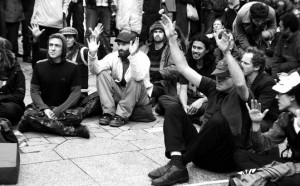 Privacy isn’t dead. But technology is changing our perception of what is private. At present, technology takes power away from the user to control their privacy – in exactly the same way as blanket CCTV does.
Privacy isn’t dead. But technology is changing our perception of what is private. At present, technology takes power away from the user to control their privacy – in exactly the same way as blanket CCTV does.
Our biggest challenge is making people realise that their privacy is important – and to realise that the slow trickle of authoritarian and intrusive laws will have consequences for their families.
“I’ve got nothing to hide, so why should I care what people know?” When I hear that argument, I ask: “How many cameras would you like in your bedroom, and which is your partner’s good side?” Suddenly, people then discover they do care about privacy after all.
The UK has roughly 1% of the world’s population and 20% of the world’s CCTV – the result of a uniquely unaccountable bureaucracy that has largely won the argument that everyone is suspect.
The “Big Brother society” is about trusting nobody and monitoring everyone. It speaks to a vision which is more about suspecting citizens than respecting them. It fosters a climate of fear, which has exacerbated the wider breakdown of society because people are told by authorities that they should not trust their neighbours and should regard everyone as a potential threat.
In all likelihood, the budget of GCHQ exceeds £1bn. We know that the figure of £2bn has been mooted around a project to massively increase monitoring of UK internet and digital communications. GCHQ does essential work keeping the public safe, and that work is only undermined if we start asking them to watch out for people looking at porn or Lady GaGa MP3s, as some people would like.
The police rely on the public’s trust to do their job. The case of the Metropolitan Police Authority not knowing about the force’s purchase of a £3m spy plane is a classic example of an accountability failure. Sadly it is not unique. Forces are reluctant to disclose their capabilities, but there have been numerous cases of technology and police powers being used for purposes a democratic society would not approve of. As a result, the police’s reaction seems to be focused on avoiding scrutiny, rather than a public discussion of the problem.
Deliberately evading public scrutiny only undermines the wider trust in the police. Ultimately, this undermines public safety far more than not having the technology in the first place. I don’t have a problem with the police having access to the best equipment and tools to protect the public. What I object to is the watering down of the threshold when it can be used. Fine, retain communications interception capabilities for dealing with a terrorist threat, but don’t then try to argue that something like the Occupy protest or the student fees demonstration are terrorist threats.
If I could be Justice Secretary for a day – I’d set in law that no innocent person’s details, photograph or biometric material can be held by the police once they have been acquitted or not charged.
You can only be fined for breaches of the Data Protection Act. Big Brother Watch is calling for custodial sentences to be available to courts. There have been cases of bank employees prying into people’s bank accounts and it’s clear the punishments don’t currently reflect the scale of intrusion.
The Digital Economy Act – introduced the potential for people’s internet connections to be disconnected for behaviour which is not a criminal offence. The Coalition has not yet brought into force those powers but the lobbying voices are desperate for them to be. What’s more, they are also calling for website blacklists, Government-sanctioned censorship and with the added pressure of morality campaigns, 2012 is looking like a defining year in the battle for freedom of expression and privacy online.
The best weapon is a more informed consumer. Take contactless paying – the danger is where it’s used for tracking and storing our behaviour (for example, journeys made using an Oyster card) without our knowledge or consent. There is a real risk that consumers will be forced to sacrifice privacy in the name of convenience.
If you’re not paying for something, you are the product. Your personal information is valuable and expect people to be intent on profiting from its exploitation.
Keep it simple is a good way to protect your privacy – using cash, paper tickets and only filling in information on forms that is needed, not everything that is asked for. In practical steps people should think carefully about any time they are asked to hand over personal information – assume everything you write down will be stored and available for inspection by someone, somewhere. Whether it’s using a loyalty card, signing up for a library or using social media, think twice about how much information about yourself you hand over.
Someone once said it is poor civic hygiene to leave the next generation a state with the machinery of an oppressive regime in place. I think that’s a fair summary of why I believe that protecting privacy and civil liberties is important for the preservation of freedom today, and society tomorrow.
Nick Pickles is Director of civil liberties and privacy campaign group Big Brother Watch (bigbrotherwatch.org.uk)





